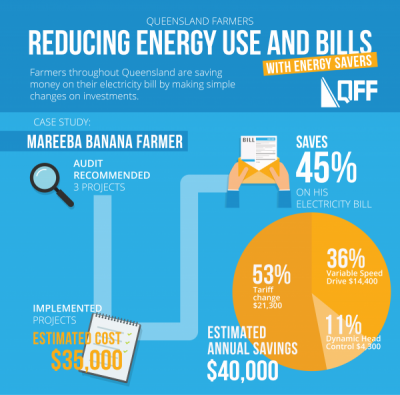 The Energy Savers Program, funded by the Queensland Government and delivered by the Queensland Farmers’ Federation (QFF) in partnership with Ergon, is assisting farmers to reduce energy costs by supporting the adoption of improvements in on-farm energy use.
The Energy Savers Program, funded by the Queensland Government and delivered by the Queensland Farmers’ Federation (QFF) in partnership with Ergon, is assisting farmers to reduce energy costs by supporting the adoption of improvements in on-farm energy use.
Over 130 audits of irrigation and on-farm processing systems are being conducted throughout Queensland to assist farmers to identify suitable energy efficiency and renewable energy opportunities. To date, the audits have identified a range of opportunities to reduce energy costs, with almost $3 million of annual energy cost savings identified in projects with payback periods of 5 years or less.
Recommendations for irrigation have included reducing friction losses in irrigation pipes, replacing oversized or inefficient motors and pumps, and adding variable speed drives where pumps have multiple duties.
On-farm processing opportunities include maintaining coldroom doors and seals, solar water heating, ventilation efficiency in intensive animal industries, upgrading or consolidating refrigeration systems, and solar photovoltaic (PV) power systems.
A Mareeba banana farm is reducing the irrigation costs on one pump serving 11 blocks by almost $40,000 per year with the addition of a variable speed drive and a tariff change recommended in the audit. As an added bonus, they are achieving more consistent watering and expect reduced maintenance costs.
A Brisbane nursery is reducing energy consumption by 45% to 70 megawatt hours per year after installing a solar water heating system, a new smaller variable speed pump and LED lighting. This has realised $12,000 in annual electricity cost savings, recouping their investment within a year; and the ability to deliver a more consistent product through more even watering.
The results are showing that as well as energy savings, farmers are seeing benefits through better irrigation efficiency, lower maintenance costs and even some time savings.
QFF and Ergon are assisting farmers with implementation advice after the audits, with over 54% having implemented some findings or indicating an intention to implement, with this number expected to grow as the program continues.
Commitment to continue assisting farmers through on-farm energy efficiencies must include:
- further integrating energy and water efficiency initiatives that recognise the energy-water-climate nexus to provide additional integrated audits
- non-irrigation energy consumption such as packing and processing
- tariff reform to ensure that agricultural businesses are rewarded with proportionate cost savings where energy efficiencies are made.
For more information on Energy Savers including case studies visit the QFF website.
This article was compiled by QFF as part of its four-part series looking in to how the state’s electricity network can be improved to better service and support the agricultural sector.